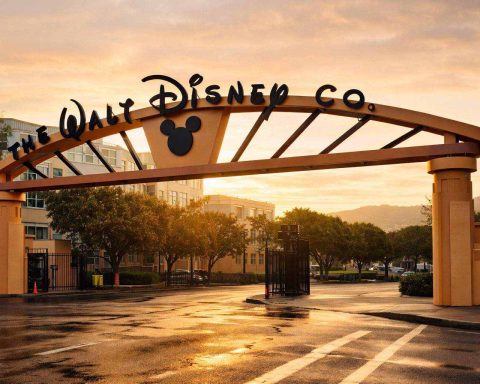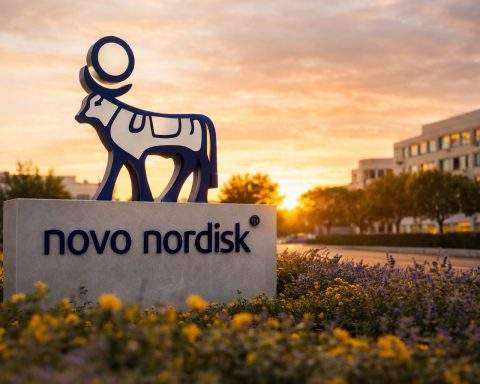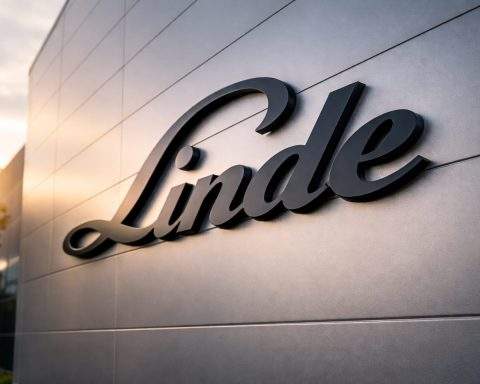- OpenAI raised $8.3 billion at a $300 billion valuation in a funding round led by Dragoneer with a $2.8 billion check, as SoftBank commits up to $40 billion in total (with $10 billion already in April and $30 billion more by year-end) and new backers include Blackstone, TPG, and Sequoia.
- AI-driven M&A surged to $2.6 trillion in the first seven months of 2025, up 28% in value year over year despite a 16% decline in deal count, led by U.S. mega-deals over $10 billion.
- In Europe, Engie, RWE, and Enel are repurposing aging coal and gas plants as AI data centers to meet surging computing power demand, with Microsoft and Amazon involved and faster permits noted.
- MIT and Duke researchers used machine learning to design polymers with mechanophores that absorb force and resist cracking, identifying ferrocene-based additives and showing improved toughness.
- Profluent Bio created OpenCRISPR-1, a human genome-editing enzyme designed entirely by AI after training on 500 million protein sequences and fine-tuning with 5.1 million CRISPR examples, published in Nature and open-sourced.
- Google pledged to curb AI data center power usage during peak demand via first-of-its-kind demand-response deals with utilities in Indiana and Tennessee, aiming to reduce grid stress and the need for additional transmission capacity.
- California’s FEHA amendments on AI in hiring take effect October 1, 2025, requiring companies to retain AI-recruitment tool records for at least four years and holding vendors as potential employer agents liable for bias.
- Italy’s antitrust authority opened an investigation into Meta for integrating a Meta AI assistant into WhatsApp without user consent, raising concerns about tying and EU competition rules.
- South Korea announced plans for mandatory human-rights due diligence by companies with more than 500 employees to govern AI-driven supply chains.
- On August 4, 2025, legal experts published guidance to help lawyers avoid AI hallucinations and fake citations, signaling standards for responsible AI use in law, medicine, and education.
Over the past two days, the AI landscape has seen massive funding moves, cutting-edge research, new rules, and heated debates across the globe. From multi-billion dollar investments to academic breakthroughs and policy showdowns, here are the major AI developments from August 4–5, 2025.
Business & Industry: Funding Frenzy and Tech Moves
- OpenAI’s Mega-Fundraising: The creator of ChatGPT, OpenAI, is in the midst of an unprecedented funding drive. The company raised $8.3 billion at a $300 billion valuation, as part of a plan to secure $40 billion this year techcrunch.com. The round is led by Dragoneer Investment Group with a $2.8 billion check, bringing in new backers like Blackstone, TPG, and Sequoia techcrunch.com techcrunch.com. This follows SoftBank’s commitment to invest up to $40 billion (with $10 billion already in April and $30 billion more by year-end) as OpenAI transitions to a for-profit model reuters.com reuters.com. “AI is a defining force shaping humanity’s future. Our expanded partnership with OpenAI accelerates our shared vision to unlock its full potential,” said SoftBank CEO Masayoshi Son in a statement reuters.com. Analysts note the cash is critical: “OpenAI has very ambitious plans on many fronts and needs a lot of capital to achieve these goals,” remarked Gil Luria of D.A. Davidson 1 .
- AI-Fueled M&A Surge: A new report shows global dealmaking hit $2.6 trillion in the first seven months of 2025 – the highest post-pandemic peak – “as a quest for growth in corporate boardrooms and the impact of a surge in AI activity” spurred big deals reuters.com reuters.com. While the number of deals is down 16% year-on-year, total value is up 28%, thanks to U.S. mega-deals over $10 billion reuters.com. Notably, companies cite AI as a major motivation. “Whether it’s artificial intelligence [or] the change in the regulatory environment, we see our clients not wanting to be left behind in that race and that’s driving activity,” explained Andre Veissid, EY’s global transactions leader reuters.com. Among headline deals: Union Pacific’s proposed $85 billion acquisition of Norfolk Southern, and OpenAI’s own $40 billion funding round reuters.com. M&A in sectors tied to AI is booming – e.g. data-center infrastructure and cybersecurity – as firms seek to bolster capabilities for an AI-driven future reuters.com 2 .
- Big Tech Repurposes Power Plants: In Europe, aging coal and gas power plants are getting a second life as AI data centers amid skyrocketing demand for computing power. Utilities like Engie (France), RWE (Germany), and Enel (Italy) are partnering with tech giants to convert old plant sites into data centers, leveraging their ready-made grid connections and cooling water supply reuters.com reuters.com. This helps utilities offset the high costs of plant closures, while companies like Microsoft and Amazon gain fast-track access to power for AI workloads reuters.com reuters.com. “You have all the pieces that come together – water infrastructure and heat recovery,” noted Bobby Hollis, Microsoft’s VP of Energy, pointing out the benefits of using retired plant sites reuters.com. Amazon’s energy director for EMEA added that permits are likely quicker at these locations since infrastructure is already in place reuters.com. The AI boom’s ravenous energy needs are thus driving creative solutions and lucrative long-term deals between Big Tech and power companies.
Academic & Research: Breakthroughs from Lab to Life
- AI Makes Plastics Tougher: A team from MIT and Duke University announced a materials science breakthrough, using machine learning to design stronger polymers that resist tearing news.mit.edu news.mit.edu. The AI model helped identify special stress-responsive molecules (mechanophores) that, when added as crosslinkers in plastics, allow the material to absorb force and avoid cracking news.mit.edu news.mit.edu. “You apply some stress to them, and rather than cracking or breaking, you instead see something that has higher resilience,” explained Prof. Heather Kulik of MIT, senior author on the study news.mit.edu. The algorithm zeroed in on ferrocene-based compounds as promising additives – a process that would have taken experimental chemists weeks per candidate, but which AI accelerated dramatically news.mit.edu. When tested, polymer networks with these AI-picked molecules showed significantly improved toughness news.mit.edu. The work, published in ACS Central Science, demonstrates how AI can speed up materials discovery for more durable, sustainable plastics 3 .
- AI-Designed Genome Editor: In a landmark for biotechnology, researchers at Profluent Bio (an AI-driven biotech startup) used generative AI to create a new human genome-editing enzyme dubbed OpenCRISPR-1. The team trained a massive protein language model on 500 million protein sequences, then fine-tuned it with 5.1 million CRISPR-related examples brownstoneresearch.com brownstoneresearch.com. The result is the first-ever CRISPR enzyme designed entirely by AI, not by human engineers brownstoneresearch.com. Remarkably, the AI came up with proteins “hundreds of mutations away from any known natural protein,” custom-tailored for gene editing tasks brownstoneresearch.com. These novel enzymes were shown to successfully edit human genomes with high precision businesswire.com. Profluent has published the breakthrough in Nature and open-sourced OpenCRISPR-1 to catalyze further research finance.yahoo.com. Scientists say this achievement – leveraging AI, advanced semiconductors, and biology – “would have been impossible even five years ago” due to computational costs brownstoneresearch.com. It heralds a new era where AI can invent biotech tools, potentially accelerating cures and therapies.
Policy & Regulation: New Rules and Government Action
- Google’s Power Pledge: Facing strain on electrical grids, Google has agreed to curb AI data center power usage during peak demand to help U.S. utilities avoid blackouts reuters.com reuters.com. The company signed first-of-their-kind “demand response” deals with utilities in Indiana and Tennessee, committing to temporarily throttle back its machine-learning workloads when called upon reuters.com reuters.com. This move comes as power companies are inundated with electricity requests for new AI supercomputing centers, raising fears of spiking costs for consumers and shortages of supply reuters.com. Google says scaling down AI usage at critical times will “reduce the need to build new transmission and power plants” and help grid operators manage surges more efficiently reuters.com reuters.com. While only a small step, it’s a notable precedent balancing Big Tech’s AI energy appetite with public infrastructure limits.
- California’s AI Hiring Law: On August 4, California’s Civil Rights Council approved new regulations on AI use in hiring and employment – set to take effect October 1, 2025 natlawreview.com natlawreview.com. These rules, amending the Fair Employment and Housing Act (FEHA), make it clear that anti-discrimination laws fully apply to automated decision systems used by employers natlawreview.com natlawreview.com. Under the regulations, companies must keep records on any AI-driven recruitment or screening tools for at least 4 years natlawreview.com, and vendors providing such tools can be deemed an “agent” of the employer – hence also liable under FEHA natlawreview.com. Critically, it will be “no defense to say, ‘the AI did it’” if a hiring algorithm ends up biased natlawreview.com. Employers are encouraged to proactively test for bias in their AI systems; those efforts (or lack thereof) will be “relevant” in any discrimination claims natlawreview.com. California’s move continues a trend of policing AI in the workplace to protect job applicants from hidden bias and ensure accountability.
- Italy Probes Meta’s AI Chatbot: European regulators are also cracking down. Italy’s antitrust authority launched an investigation into Meta on allegations it abused its dominance by integrating a Meta AI assistant into WhatsApp without proper user consent reuters.com reuters.com. The concern is that by silently adding its AI chatbot into the hugely popular messaging app, Meta could unfairly steer millions of users toward its own AI services, squeezing out competitors reuters.com reuters.com. “By pairing Meta AI with WhatsApp, Meta appears able to steer its user base…not through merit-based competition, but by ‘forcing’ users to accept two distinct services,” the AGCM regulator warned reuters.com. Such tying could violate EU competition rules. Meta, in response, said it is cooperating with authorities and defended the feature: “Offering free access to our AI features in WhatsApp gives millions of Italians the choice to use AI in a place they already know, trust and understand,” a Meta spokesperson said reuters.com. The case highlights growing EU scrutiny of Big Tech’s AI deployments – and possible requirements for transparency and user consent when AI is baked into consumer platforms.
- Global AI Governance Moves: Internationally, governments are stepping up oversight. For instance, South Korea announced plans for mandatory human-rights due diligence by companies with over 500 employees reuters.com, to ensure supply chains are free of labor abuses. The move, highlighted in the context of AI-driven supply chain monitoring, shows regulators linking AI usage to corporate social responsibility. And in the U.S., the White House’s recently unveiled AI Action Plan (July 23) – emphasizing “de minimis” regulation and promoting American AI leadership – continues to spur debates on the proper balance of innovation and oversight techcrunch.com. Overall, August has seen a flurry of policy activity, from new laws and probes to high-level strategic plans, as authorities race to set guardrails around AI.
Ethical & Social: AI at the Crossroads of Culture and Society
- Actors vs. AI in Dubbing: A showdown is brewing between voice actors and AI firms over the future of dubbing in film and TV. Across Europe, voice actors are “calling on the EU to tighten regulations” on AI-generated voices to protect jobs, artistic quality, and performers’ rights reuters.com. They fear that advances in synthetic voice tech could cheaply replace human dubbers. “I feel threatened even though my voice hasn’t been replaced by AI yet,” said Boris Rehlinger, a famous French dubbing artist (the voice of Ben Affleck and others) reuters.com reuters.com. Rehlinger and colleagues have formed initiatives like TouchePasMaVF (“Don’t Touch My French Version”) to fight for human dubbing. They argue that dubbing is an art requiring human emotion and nuance – and that AI replicas using past recordings violate performers’ rights. “We need legislation: just as after the car replaced the horse-drawn carriage, we need a highway code,” Rehlinger told Reuters, urging clear rules for AI reuters.com. Their push comes as streaming platforms experiment with AI for localization. Netflix, for example, revealed it used generative AI to help synchronize lip movements for dubbing in a recent series reuters.com. And earlier this year a Polish show’s German dub, partly done with AI voices, drew such backlash for its monotony that the version was pulled from circulation reuters.com. Unions like Germany’s VDS have gathered 75,000+ signatures on a petition demanding AI companies obtain explicit consent before training on an actor’s voice and clearly label AI-generated content reuters.com. The battle over “artistic, not artificial, intelligence” is now a focal point in the entertainment industry, mirroring concerns in Hollywood’s ongoing strikes about scanning actors’ likenesses. It underscores the broader ethical question: how to harness AI’s efficiency without hollowing out human creativity and careers.
- AI Hallucinations Under Scrutiny: Meanwhile, other sectors grapple with AI’s reliability. In the legal world, recent incidents of AI chatbots “hallucinating” fake citations have spurred warnings to attorneys. On Aug 4, legal experts published guidance to help lawyers avoid embarrassing mistakes after a few high-profile cases where filings written by AI contained nonexistent case law reuters.com. Regulators and professional bodies are debating standards for responsible AI use in law, medicine, and education – weighing the risks of misinformation, bias, and errors against the potential benefits. These debates reflect a growing social consensus: AI tools must be used carefully and ethically, with human oversight, to prevent harm.
From boardrooms to research labs, parliaments to picket lines, the last 48 hours in AI have showcased breakneck progress accompanied by vigorous oversight and critique. Billion-dollar bets on AI’s future are coinciding with urgent calls to address its pitfalls. As this roundup shows, the global AI narrative in early August 2025 is one of extraordinary promise — tempered by the realization that shaping AI’s impact requires vigilance from all corners of society.
Sources: Reuters, TechCrunch, MIT News, ScienceDaily, NatLawReview reuters.com reuters.com reuters.com news.mit.edu brownstoneresearch.com reuters.com natlawreview.com reuters.com reuters.com 4 .






